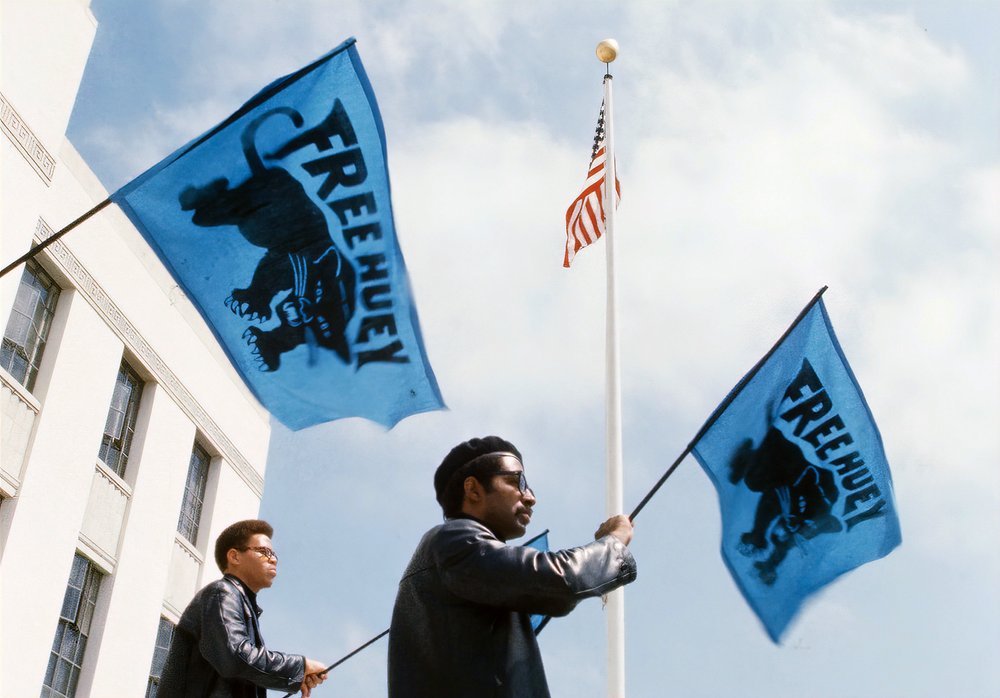
Join the campaign!
Among the social and political forces that roiled the nation in the 1960s, few have been the subject of as intense debate as the Black Panther Party. When Huey P. Newton and other early Party members began their historic patrols of the Oakland Police Department armed with law books to explain to members of the community their basic constitutional rights, the Black Panther Party attempted to provide an example to the community of what is possible and to raise the people's political consciousness. Huey P. Newton and Bobby Seale organized their communities to end police brutality, poverty, and political disenfranchisement when they founded the Black Panther Party for Self-Defense in 1966.
From 1916 - 1970, 6 million Black Americans left the South for urban cities in the Northeast, Midwest, and West. Thousands of those migrants settled in Oakland and the surrounding Bay Area in search of better quality jobs and lives than offered in the Jim Crow South. While World War II offered relatively good jobs, prosperity dwindled in the postwar era and, despite their strivings, many Blacks in Oakland faced extreme poverty. From unemployment and poor living conditions to poor healthcare and pervasive police violence, Black and oppressed communities struggled to live and the government did not provide vital support to their newly settled taxpayers in the same ways they subsidized white business owners.
The Black Panther Party worked to meet the urgent needs of Oakland’s Black and poor communities, and as the movement grew and Party chapters opened in other cities, the work was replicated across the nation.
In Oakland, Party members distributed thousands of bags of food and clothes; they held after-school programs, registered voters, staged rallies demanding the release of Party members who’d been imprisoned, and they protested police violence. They started healthcare clinics, transportation programs, a free ambulance program, housing programs and fed schoolchildren. They lifted up their community in meaningful ways and did it under the specter of government and police harassment.
Yet, a skewed depiction of the Party saturated the news media – one of violence and controversy and anti-white radicalism. This inaccurate portrayal was intentionally disseminated, according to FBI documents, and stems from a well-documented, frequently illegal and ultimately successful campaign by the federal government to destroy the Party. Party members were painted as thugs, terrorists and hoodlums.
By late 1968, the FBI had added the Black Panther Party to its list of “black nationalist hate groups,” and Director J. Edgar Hoover instructed agents to “submit imaginative and hard-hitting counterintelligence measures aimed at crippling the BPP.” Around the same time, Hoover was widely quoted as saying that “the Black Panther Party, without question, represents the greatest threat to internal security of the country.” Over the next few years, agents carried out more than 200 operations against the Panthers. According to a 1976 Senate committee investigation of the FBI’s counterintelligence program, agents harassed and intimidated Party members and would-be allies, infiltrated and bugged local chapters, fomented internal divisions, and planted lies in the press. (It is estimated that 73% of newspaper articles about the Panthers from this era were penned or influenced by FBI agents.) Instead of hearing about the Black Panther Party’s 65 community survival programs, the American public was fed with FBI-tainted news stories.
This inaccurate narrative cannot stand, and a National Park Monument will serve as a fundamental step in providing visitors the opportunities to immerse themselves in the complex history of the Black Panther Party that a National Park can embrace and showcase.

“It is time that the NPS strategically organize its many urban parks and programs towards building relevancy for all Americans, to connect with their lives where they live, rather than only where some may spend their vacation.”
- Jonathan B. Jarvis, Director Emeritus of National Park Service
While you may usually think of National Parks as outdoor spaces like Yosemite and Yellowstone, in 2016 the National Park Service published their Urban Agenda Call to Action Initiative, turning their attention to parks in urban cities, where 80% of American live. The Black Panther Party National Monument will be the first National Park unit in Oakland, California.

Sign the Petition
to support the creation of a Black Panther Party National Monument




































